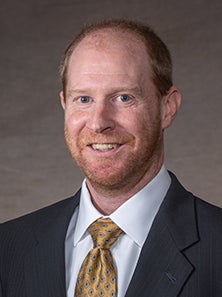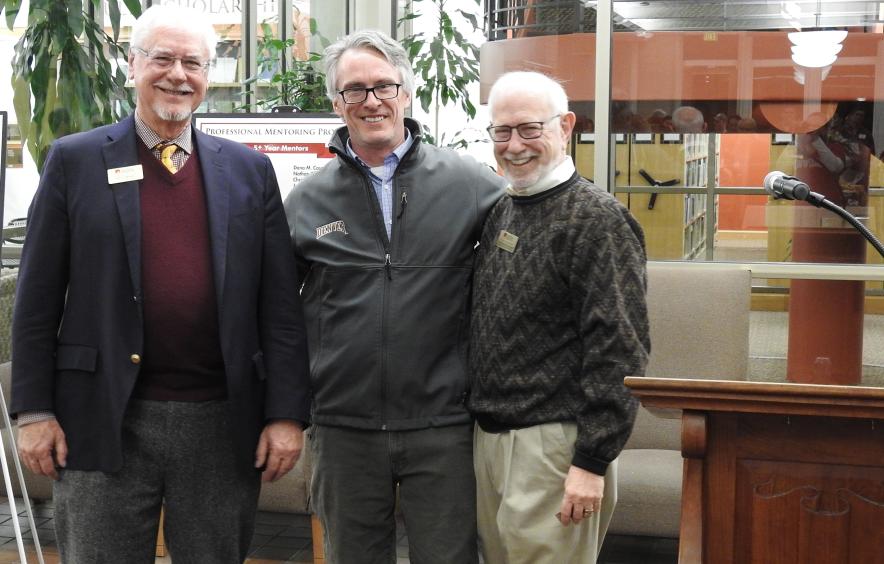Michael G. Massey Professional Mentoring Program
Mentors can have a remarkable professional influence on a law student’s career by offering advice not only on specific legal skills but also on classes, employment opportunities and practice areas.
The Michael G. Massey Professional Mentoring Program (the "Program") offers all Denver Law students (JD and graduate programs) and recent graduates the opportunity to develop a professional relationship with a mentor. Students and recent graduates who participate in the Program (often called "mentees") are matched with mentors according to career interest areas and other factors. Once matched, students and mentors engage in a series of discussions guided by suggested discussion topics provided by the program.
The Michael G. Massey Professional Mentoring Program has three sub-programs:
- The Juris Doctorate Program matches JD students with an attorney or judge mentor.
- The Summer Program matches current JD students with a mentor during the summer, often in situations where a student wants a mentor located in a market outside of the Denver Metropolitan Area.
- The Graduate Mentoring Program offers current graduate students in the law school the opportunity to connect with an alumnus of their graduate program or a comparable professional.
The Program engages in periodic outreach campaigns, mostly through word-of-mouth and email forwarding among DU Law's alumni network and friends of the law school.
Information for Program Participants
Students
The Michael G. Massey Professional Mentoring Program is here to support your efforts to establish and grow your professional relationships.
-
Why Participate?
More than any other factor, your career satisfaction and success will be driven by your ability to develop strong, long-lasting, authentic professional relationships. In today’s economy, intelligence, knowledge and skills are not enough. Students who thrive after graduation are those who develop strong interpersonal and professionalism skills. And like the knowledge you learn and the skills you cultivate during school, relationship-building requires learning and development. The Professional Mentoring Program is here to support your efforts to establish and grow your professional relationships.
Once enrolled in the Program, you will have the opportunity to be matched with a practicing or recently retired attorney or judge. You and your mentor will meet monthly at times and places of your mutual choosing where you will engage in a series of practice- and law school-related discussions. These discussions can follow the Program's suggested Discussion Topics, which include topics like career paths, professionalism, ethics, networking, and practical career tips, among other topics. Alternatively, you and your mentor can discuss other topics of your choosing, such as work-life balance, coursework, or substantive law.
We hope that you will use your mentor, and any opportunities you may have to speak with other mentors in the Program, and other lawyers and judges with whom your mentor works, to create strong relationships within the legal profession. These relationships will likely become important, either in the immediate future or sometime further down the road. We also hope your discussions with your mentor will help you: (1) absorb the culture of the legal profession; (2) gain perspective about what lawyers do; and, (3) see how the substantive law you learn in class is applied in the “real world.” Finally, we hope that the Program will help you develop strong networking skills. These skills do not come easily, but they will come with effort and practice.
To participate in the Program, please complete and submit the Student Application. Before doing so, please read the "Requirements & Information" tab below.
-
Requirements & Information
To participate in the Student Program, you must:
- Be a student at Sturm College of Law;
- Be willing to commit the necessary time to meet once per month with your mentor;
- Be willing to communicate with your mentor regularly, including timely responding to your mentor's communications;
- Be willing to attend the beginning-of-the-year orientation/networking exception, and the end-of-the-year Appreciation Reception;
- Remain in good standing with the Program;
- Complete and submit the Student Application; and
- Agree to and electronically sign the “Statement of Participation” at the end of the “Law Student Application.”
If admitted to the Program, you will meet with your mentor several times each month at mutually agreed upon dates, times and places. If you meet at your mentor’s office, please dress appropriately.
The relationship you have with your mentor is largely what you and your mentor make it. Mentoring relationships within the Program vary greatly. Students and mentors often decide to meet more frequently than the Program requires; others decide to meet only as required. We ask that you and your mentor keep your discussions professional and consider the professional development purposes of the Program when meeting.
Please remember that your mentor has volunteered their time. Be flexible regarding your mentor’s practice obligations. Occasionally mentors have extremely busy periods where they will be unable to meet – such as the month of a trial. And although finding employment is important, do not expect your mentor to offer you a job. Your mentoring relationship is an opportunity for you to learn and develop necessary professional skills. If employment opportunities arise out of the relationship, great. However, employment opportunities from contact with a single person - i.e., your mentor - are rare; instead, employment opportunities generally result from continued, persistent networking, relationship building and professional development.
If you have any questions about the Program, please contact the Program Coordinator, at mentor@law.du.edu.
- Student Applications
Mentors/Future Mentors
Mentors can mentor current law students, recent law student graduates, or current graduate program students.
-
Why Participate?
Mentors serve as a career liaison, role-model, and professional friend. They provide practical career insights, information about the job market, and contribute to the mentee’s cultivation of their own unique professional identity.
Mentors can mentor current law students or current graduate program students – such as students in the Graduate Tax Program, the Master of Science in Legal Administration Program, or the Environmental Law Graduate Program, among others. Mentors for JD students must be current or retired attorneys or judges. Mentors of other programs must be in or adjacent to the legal profession. Being a graduate of DU’s Sturm College of Law is NOT a requirement. We welcome – and appreciate! – all legal practitioners who are willing to volunteer.
A recurring comment from mentors who have participated in the Program for many years is how much it has helped them learn and network. Although mentors commit their time to help mentees, they are often surprised how much their mentees help with their own professional career development and advancement. While mentors can share their experience with mentees, mentees can often share their knowledge of technology, electronic research methodologies, and writing trends, as a few examples. Moreover, mentors who have been in the program for years (some with 15+ years) frequently remark about "running into" their former mentees while practicing.
To participate in the Program, please complete and submit the Mentor Application. Additional information about the Program is available in the “Requirements & Information” section.
-
Requirements & Information
The Program asks that participants to do everything in their power to meet at least once per month throughout the academic year (i.e., about three times per semester for JD students, or two times per quarter for graduate students). The date, time and place of each meeting is established by the mentor and the student. The Program sends monthly Meeting Reminder Emails that can be used to spur coordination between mentors and mentees regarding scheduling a meeting.
At the meetings, mentors and mentees are free to discuss any professional topic they like. However, the Program provides suggested Discussion Topics that mentors and mentees can use as a conversation guide. The Program also asks mentors to commit to working with the same student(s) throughout their time at DU Law if their student(s) is/are willing.
In addition to the monthly topic meetings, mentors and students are asked to attend one orientation meeting at the beginning of each academic year, as well as an end of the year Volunteer Appreciation Reception. The Program also invites mentors and mentees to a breakfast reception following the winter break, and we frequently offer free continuing legal education (CLE) events that mentors and students can attend individually or together. The Program Calendar lists recurring event dates for the academic year, though continuing legal education seminars are promoted by email throughout the year.
Mentors are strongly encouraged to communicate with their students frequently. If you find your schedule precludes you from continuing in the Program, please contact the Program Coordinator at mentor@law.du.edu.
The amount of contact between a mentor and a mentee varies greatly. Many mentors and mentees discuss the suggested Discussion Topics and meet more frequently to discuss other issues. Others meet as suggested.
As a mentor, you can choose to be assigned a Juris Doctorate student in the day division (1L, 2L, or 3L), a Juris Doctorate student in the evening division (1L, 2L, 3L, or 4L), or a student in one of the law school’s graduate programs (Master of Legal Studies, Master of Laws (LLM) in American Law Practice, Environmental & Natural Resources Law and Policy, Taxation, or International Business Transactions). Information you provide on the Mentor Registration Form will be used to match you with a mentee. Many mentors continue mentoring their student throughout their student's law school career, seeing their student transition from green to well-rounded lawyer.
If you are interested in becoming a mentor, please complete and submit the Mentor Application Form (below). After submittal, you will receive a confirmation email. Contact information for your mentee and the Program Calendar will be forwarded to you via email as soon as the Program matches you with a student (usually occurring in late July or August).
- Mentor Applications
Michael G. Massey Professional Mentoring Program Team





